| Listing 1 - 10 of 13 | << page >> |
Sort by
|
Book
Abstract | Keywords | Export | Availability | Bookmark
 Loading...
Loading...Choose an application
- Reference Manager
- EndNote
- RefWorks (Direct export to RefWorks)
« Même les paranoïaques ont des ennemis », aurait répondu Golda Meir à Henry Kissinger en 1973. Le secrétaire d'État américain avait accusé l'excès de prudence dont faisait preuve le chef du gouvernement israélien lors des négociations territoriales avec l'Égypte. L'histoire nous rappelle ainsi que la paranoïa est, aussi, un problème de frontières : où s'arrête le sain discernement des dangers qui nous menacent et où commence le délire ? Quand le gentil parano devient-il un dangereux paranoïaque ? La paranoïa est-elle une activité délirante ou plutôt une « activité désirante », propre à inspirer les plus grands - Rousseau, Strindberg, Céline ou encore Artaud ? La difficulté se corse encore lorsque, de l'individu, on s'intéresse à la société. Big Brother est-il un fantasme de parano, ou la forme prise par un pouvoir d'essence paranoïaque ? La multiplication des procès en harcèlement (sexuel, moral...) reflète-t-elle une attention plus grande portée aux victimes ou résulte-t-elle de rapports humains toujours plus paranoïaques ? En compagnie de grandes figures littéraires, nous avons voulu éclairer quelques aspects de notre « société parano ».
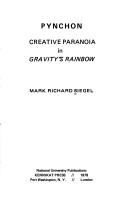
ISBN: 0804692130 9780804692137 Year: 1978 Publisher: Port Washington London Kennikat Press
Abstract | Keywords | Export | Availability | Bookmark
 Loading...
Loading...Choose an application
- Reference Manager
- EndNote
- RefWorks (Direct export to RefWorks)
Pynchon, Thomas --- Paranoia in literature --- Pinchon, Tomas --- Pynchon, Thomas. --- Pynchon, Thomas. - Gravity's rainbow
Book
Year: 2016 Publisher: Albany, New York : SUNY Press,
Abstract | Keywords | Export | Availability | Bookmark
 Loading...
Loading...Choose an application
- Reference Manager
- EndNote
- RefWorks (Direct export to RefWorks)
Oscillations of Literary Theory offers a new psychoanalytic approach to reading literature queerly, one that implicates queer theory without depending on explicit representations of sex or queer identities. By focusing on desire and identifications, A. C. Facundo argues that readers can enjoy the text through a variety of rhythms between two (eroticized) positions: the paranoid imperative and queer reparative. Facundo examines the metaphor of rupture as central to the logic of critique, particularly the project to undo conventional formations of identity and power. To show how readers can rebuild their relational worlds after the rupture, Facundo looks to the themes of the desire for omniscience, the queer pleasure of the text, loss and letting go, and the vanishing points that structure thinking. Analyses of Nabokov's Lolita, Danielewski's House of Leaves, Findley's The Wars, and Ishiguro's Never Let Me Go are included, which model this new approach to reading.
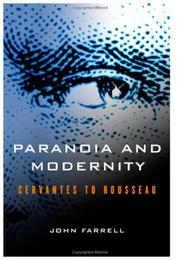
ISBN: 9780801444104 0801444101 Year: 2006 Publisher: London Cornell University Press
Abstract | Keywords | Export | Availability | Bookmark
 Loading...
Loading...Choose an application
- Reference Manager
- EndNote
- RefWorks (Direct export to RefWorks)
Thematology --- Psychiatry --- Psychological study of literature --- Paranoia in literature. --- Agent (Philosophy). --- Civilization, Modern --- Paranoia --- Personality and culture. --- Psychological aspects. --- Philosophy.
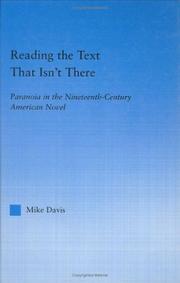
ISBN: 1135876142 1280165170 0203006054 9780203006054 0415971055 9781135876142 9781280165177 9781135876098 9781135876135 9780415971058 9781138011670 1138011673 1135876134 Year: 2005 Publisher: New York Routledge
Abstract | Keywords | Export | Availability | Bookmark
 Loading...
Loading...Choose an application
- Reference Manager
- EndNote
- RefWorks (Direct export to RefWorks)
Through a careful examination of the work of the canonical nineteenth-century novelists, Mike Davis traces conspiracies and conspiratorial fantasy from one narrative site to another.
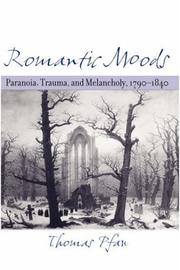
ISBN: 0801881978 9780801881978 Year: 2005 Publisher: Baltimore: Johns Hopkins university press
Abstract | Keywords | Export | Availability | Bookmark
 Loading...
Loading...Choose an application
- Reference Manager
- EndNote
- RefWorks (Direct export to RefWorks)
Thomas Pfau reinterprets the evolution of British and German Romanticism as a progress through three successive dominant moods, each manifested in the "voice" of an historical moment. Drawing on a multifaceted philosophical tradition ranging from Kant to Hegel to Heidegger—incorporating as well the psychosocial analyses of Freud, Benjamin, and Adorno—Pfau develops a new understanding of the Romantic writer's voice as the formal encryption of a complex cultural condition.Pfau focuses on three specific paradigms of emotive experience: paranoia, trauma, and melancholy. Along the trajectory of Romantic thought paranoia characterizes the disintegration of traditional models of causation and representation during the French Revolution; trauma, the radical political, cultural, and economic restructuring of Central Europe in the Napoleonic era; and melancholy, the dominant post-traumatic condition of stalled, post-Napoleonic history both in England and on the continent.Romantic Moods positions emotion as a "climate of history" to be interpretively recovered from the discursive and imaginative writing in which it is objectively embodied. Pfau's ambitious study traces the evolution of Romantic interiority by exploring the deep-seated reverberations of historical change as they become legible in new discursive and conceptual strategies and in the evolving formal-aesthetic construction and reception of Romantic literature. In establishing this relationship between mood and voice, Pfau moves away from the conventional understanding of emotion as something "owned" or exclusively attributable to the individual and toward a theory of mood as fundamentally intersubjective and deserving of broader consideration in the study of Romanticism.
Comparative literature --- Emotions in literature. --- English literature --- German literature --- Melancholy in literature. --- Paranoia in literature. --- Psychic trauma in literature. --- Romanticism --- English and German. --- German and English. --- History and criticism. --- History and criticism --- Emotions in literature --- Melancholy in literature --- Paranoia in literature --- Psychic trauma in literature --- Young Germany --- English and German --- German and English
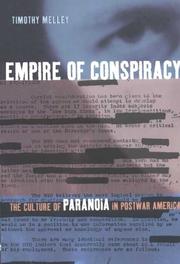
ISBN: 1501713000 1501713019 9781501713019 0801436680 0801486068 Year: 2016 Publisher: Ithaca, NY
Abstract | Keywords | Export | Availability | Bookmark
 Loading...
Loading...Choose an application
- Reference Manager
- EndNote
- RefWorks (Direct export to RefWorks)
Why, Timothy Melley asks, have paranoia and conspiracy theory become such prominent features of postwar American culture? In Empire of Conspiracy, Melley explores the recent growth of anxieties about thought-control, assassination, political indoctrination, stalking, surveillance, and corporate and government plots. At the heart of these developments, he believes, lies a widespread sense of crisis in the way Americans think about human autonomy and individuality. Nothing reveals this crisis more than the remarkably consistent form of expression that Melley calls "agency panic"-an intense fear that individuals can be shaped or controlled by powerful external forces. Drawing on a broad range of forms that manifest this fear-including fiction, film, television, sociology, political writing, self-help literature, and cultural theory-Melley provides a new understanding of the relation between postwar American literature, popular culture, and cultural theory.Empire of Conspiracy offers insightful new readings of texts ranging from Joseph Heller's Catch-22 to the Unabomber Manifesto, from Vance Packard's Hidden Persuaders to recent addiction discourse, and from the "stalker" novels of Margaret Atwood and Diane Johnson to the conspiracy fictions of Thomas Pynchon, William Burroughs, Don DeLillo, and Kathy Acker. Throughout, Melley finds recurrent anxieties about the power of large organizations to control human beings. These fears, he contends, indicate the continuing appeal of a form of individualism that is no longer wholly accurate or useful, but that still underpins a national fantasy of freedom from social control.
Paranoia in literature. --- Social problems in literature. --- Paranoia --- Political fiction, American --- Conspiracies --- Politics and literature --- Conspiracies in literature. --- American fiction --- Psychology, Pathological --- Psychoses --- History --- History and criticism. --- United States --- Civilization
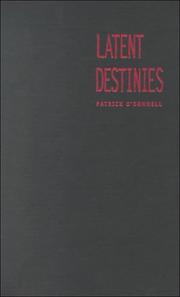
ISBN: 082232587X 9780822325871 0822325586 9786612903571 1282903578 0822380641 Year: 2000 Publisher: Durham, NC : Duke University Press,
Abstract | Keywords | Export | Availability | Bookmark
 Loading...
Loading...Choose an application
- Reference Manager
- EndNote
- RefWorks (Direct export to RefWorks)
Uses a discussion of contemporary films and literary works to present an understanding of paranoia as a defining element in postmodern late-capitalist structure.
American fiction --- Literature and society --- Motion pictures --- Narration (Rhetoric) --- Paranoia in literature. --- Postmodernism --- History and criticism. --- History --- History. --- Sociology of literature --- Fiction --- American literature --- Psychological study of literature --- anno 1900-1999 --- Paranoia in literature --- History and criticism --- Rhetoric --- Discourse analysis, Narrative --- Narratees (Rhetoric) --- ROMAN AMERICAIN --- LITTERATURE ET SOCIETE --- CINEMA AMERICAIN --- NARRATION --- PARANOIA DANS LA LITTERATURE --- POSTMODERNISME --- POSTMODERNISME (LITTERATURE) --- 20E SIECLE --- HISTOIRE ET CRITIQUE --- ETATS-UNIS
Book
ISBN: 1487507372 9781487507374 Year: 2020 Publisher: Toronto ; Buffalo ; London : University of Toronto Press,
Abstract | Keywords | Export | Availability | Bookmark
 Loading...
Loading...Choose an application
- Reference Manager
- EndNote
- RefWorks (Direct export to RefWorks)
"Contemporary Russia stands apart as one of the most prolific generators of conspiracy theories and paranoid rhetoric. Conspiracy Culture traces the roots of the phenomenon within the sphere of culture and history, examining the long arc of Russian paranoia from the present moment back to earlier nineteenth-century sources, such as Dostoevsky's anti-nihilist novel Demons. Conspiracy Culture examines the use of conspiracy tropes by contemporary Russian authors and filmmakers including the postmodernist writer Viktor Pelevin, the conservative author and pundit Aleksandr Prokhanov, and the popular director Timur Bekmambetov. It also explores paranoia as an instrument within contemporary Russian political rhetoric, as well as in Russian pseudo-historical works. What stands out is the manner in which Russian popular paranoia is utilized to express broadly shared fears not only of a long-standing anti-Russian conspiracy undertaken by the West, but also about the destruction of the country's cultural and spiritual capital within this imagined "Russophobic" plot."--
Conspiracies in literature. --- Conspiracies in literature. --- Conspiracies in popular culture --- Conspiracies in popular culture. --- Conspiration dans la culture populaire --- Conspiration dans la littérature. --- Paranoia in literature. --- Paranoia in literature. --- Paranoia in popular culture --- Paranoia in popular culture. --- Paranoïa dans la culture populaire --- Paranoïa dans la littérature. --- Roman russe --- Russian fiction --- Russian fiction. --- History --- Histoire --- History --- Histoire --- Histoire et critique --- History and criticism --- 1900-1999. --- Russia (Federation).

ISBN: 0801486068 Year: 2000 Publisher: Ithaca, NY : Cornell University Press,
Abstract | Keywords | Export | Availability | Bookmark
 Loading...
Loading...Choose an application
- Reference Manager
- EndNote
- RefWorks (Direct export to RefWorks)
American literature --- Fiction --- Thematology --- Psychological study of literature --- American fiction --- Conspiracies in literature. --- Conspiracies --- Paranoia in literature. --- Paranoia --- Political fiction, American --- Politics and literature --- Social problems in literature. --- History and criticism. --- History --- ROMAN AMERICAIN --- POLITIQUE ET LITTERATURE --- CONSPIRACIES IN LITERATURE --- PARANOIA DANS LA LITTERATURE --- 20E SIECLE --- HISTOIRE ET CRITIQUE --- ETATS-UNIS
| Listing 1 - 10 of 13 | << page >> |
Sort by
|

 Search
Search Feedback
Feedback About UniCat
About UniCat  Help
Help News
News